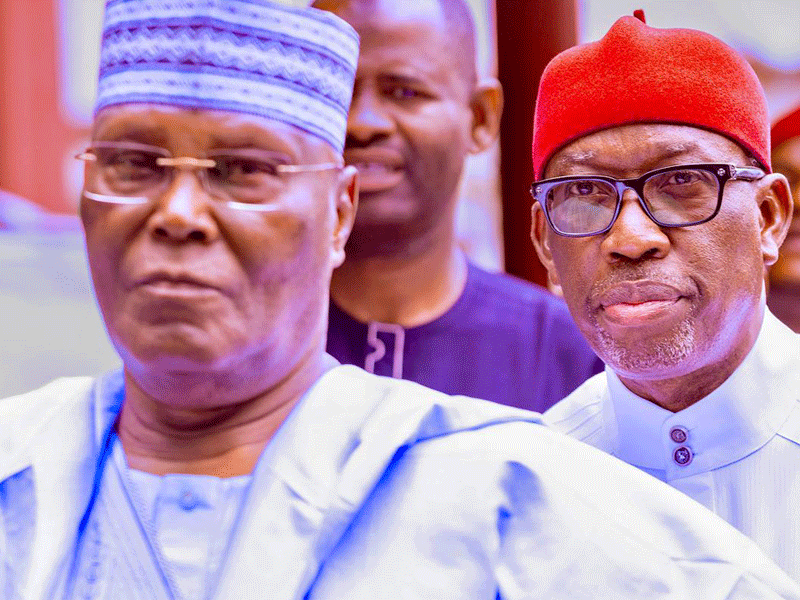
The Political Earthquake: Okowa Breaks His Silence
In a moment that has sent ripples through Nigeria’s political landscape, former Delta State Governor and 2023 vice-presidential candidate Dr. Ifeanyi Okowa has confirmed what many have speculated for months: Atiku Abubakar may be on his way out of the Peoples Democratic Party (PDP).
Okowa, speaking in an exclusive interview on ARISE News, also declared his full support for President Bola Ahmed Tinubu’s re-election bid in 2027 — a move that marks a significant departure from his former political stance.
“Atiku Is on His Way Out” — Okowa Drops the Bombshell
Okowa didn’t mince words. When asked about his defection to the All Progressives Congress (APC), he revealed it wasn’t done in isolation. In fact, it came after private discussions with Atiku himself.
“I discussed the coalition with Atiku, who is on his way out of the PDP,” Okowa stated.
With this revelation, it’s becoming increasingly clear that deep cracks in the opposition are not just speculations — they’re structural failures.
Why Okowa Is Now Backing Tinubu
In a twist few saw coming, Okowa voiced his belief that President Tinubu deserves to complete a second term. For him, it’s not just about party politics — it’s about national balance and stability.
“For the stability of this nation, it is best for us to have him complete his eight-year tenure. Then the presidency can move back to the North,” Okowa said.
This position aligns with the informal zoning agreement that has often shaped presidential power rotation in Nigeria — and it’s a stance Okowa believes serves the country’s long-term interests.
Why the PDP No Longer Felt Like Home
According to Okowa, the PDP’s internal problems had reached a breaking point. Between unresolved leadership battles, a lack of strategic direction, and poor communication among key stakeholders, the party no longer felt viable.
“It did not appear to us that [PDP] was a proper political vehicle for us to continue in,” he said.
The decision to defect wasn’t made overnight. Okowa emphasized that it involved months of consultations, not only with Governor Sheriff Oborevwori but with various political leaders and non-partisan voices across Delta State.
Grand Coalition? Not So Grand
Atiku’s proposed grand opposition coalition has been making the rounds in political circles, but Okowa isn’t buying into the hype.
“It does not seem that a viable vehicle for a coalition has been confirmed, nor does it appear that a coalition could build strength in such a short period,” he remarked.
In other words, without structure, strategy, and momentum, any attempt to unify the opposition looks more like a pipe dream than a serious plan.
Lessons from the Opposition Bench
Having served two terms as governor while the PDP was out of federal power, Okowa says he’s no stranger to the challenges that come with being disconnected from Abuja.
“Though we tried to do our best in the state, we could not lay our hands on a lot of things that would have benefited us at the federal level,” he noted.
This experience, he explained, made it clear that reconnecting Delta State to federal influence was crucial for the future.
To Critics Like Saraki: “You Don’t Get to Judge Me”
Of course, no high-profile defection goes unnoticed — and Okowa has faced criticism from PDP loyalists, including former Senate President Bukola Saraki.
But Okowa didn’t hold back:
“Saraki has had movement to and fro. So, I don’t think that he has the moral right to even speak about my defection at all.”
It’s a reminder that political evolution is common in Nigerian politics, and those who’ve taken similar routes shouldn’t throw stones.
The Bigger Picture: What This Means for 2027
With Okowa and Governor Oborevwori now aligned with the APC, and whispers growing louder about Atiku’s potential exit, the 2027 elections may see an even more fractured opposition.
So the question becomes:
Can the PDP survive this wave of defections and reorganize in time to mount a challenge?
Only time will tell. But one thing’s for sure — Nigeria’s political chessboard is already being reset.
Final Thoughts
Dr. Ifeanyi Okowa’s statements are more than just political commentary — they signal a deep realignment in Nigeria’s power structure. As political loyalties shift and new alliances form, 2027 may shape up to be one of the most unpredictable elections in recent memory.
